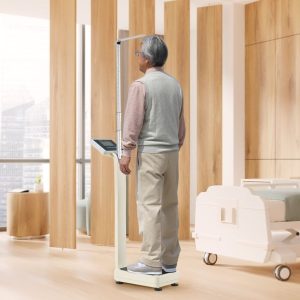
Is your medical scale acting weird, and its readings jump around, it won’t go to zero properly, or the display is flickering? Now you’re stuck with a critical decision: repair it or replace it? This isn’t just about money. It’s about patient safety and avoiding equipment downtime. Here’s how to make the right decision about your medical equipment scales without second-guessing yourself.
Índice
AlternarWhen your scale gives varying weights of your patient after minutes, doesn’t come back to zero, has visible platform damage, has repeated error messages, and needs to be recalibrated over one month, then something is wrong.
Problems related to the battery, detached cables, soiled sensors, and minor display issues can be repaired. Damaged load cells, fractured platforms, frequent component failures, or old technology are normally replaced.
Apply the 50% rule: if repair costs exceed 50% of replacement cost, replace it.
Quick decision framework:
Place a certified weight on your scale multiple times. If readings vary by more than 0.2 pounds, your scale is unreliable.
Reduced response time is an indicator of sensor issues. Your scale would stabilize in 3-5 seconds. In the case of 10-15 seconds, internal parts are getting old.
Apply certified weight, measure five times, take readings, and calculate variance. When the tolerance of the machine maker is exceeded, you must be serviced or replaced.
Inaccurate scale results in inaccurate prescription of drugs, false diagnosis, impaired treatment planning, and patient injury. Your balança de cadeira de rodas must deliver consistent measurements every time.
Most medical scales last 10-15 years under normal use. After 10 years, component degradation affects accuracy regardless of maintenance.
Replace immediately if:
Battery replacement, display fixes, cable or connection repairs, and minor platform cleaning or surface repairs are typically worth repairing. These fixes often restore functionality without high costs, extending the device’s life effectively. For more extensive damage, evaluating repair costs versus replacement is advisable.
Not worth repairing:
Get a professional assessment before deciding. If you’ve fixed the same problem twice within a year, the scale has a fundamental flaw. Replace it.
Basic service calls typically cost $150-300, covering diagnostics and calibration. Battery replacements range from $50-100, while display repairs are $200-500. Load cell repairs cost between $400-800, circuit board fixes $500-1,000, and platform repairs $300-600. These prices reflect standard industry ranges and may vary based on damage extent and labor involved.
High-use facilities should calibrate monthly.
Calibration required after:
Perform weekly spot checks using certified weights between scheduled calibrations. Professional calibration costs $150-300 per visit.
The repair and replacement decision is reduced to the cost, age, and patient care considerations. Take the 50 percent rule as a starting point. A 12-year-old scale could be fixed, but get a new one and you will have all the modern features, increased accuracy, and years of service.
In case you observe non-coherent readings or calibration drift, do not delay. Professionally assess, crunch the numbers, and make the decision that doesn’t harm your patients but also makes financial sense.
Ready to upgrade your medical scales? Browse our complete selection of professional medical equipment scales and find the perfect solution for your facility. Get accurate, reliable measurements your patients deserve, starting today.
Medical scales have a lifespan of 10- 15 years when well-maintained. High-use facilities can have 7-10 years. Lifespan is based on the frequency of usage, the quality of maintenance, and the quality of the build.
Scales used in medicine range between 1500 and 5000 US dollars, depending on the features and capacity. Basic scales start around $1,500. Models with high capacity and accessible to a wheelchair have prices between 3,000-5000.
The certification of weights can be done with simple certifications, and as per the guidelines of the manufacturer. Nonetheless, professional calibration is precise and gives regulatory compliance records. Calibration with a professional approach should be carried out annually.
With further usage, there are threats of incorrect prescription of medication, diagnosis oversights, weakened treatment decisions, regulatory offenses, and higher liability. In case of doubt of accuracy, abandon the scale.
Most of the scales have 1-3 year warranties against manufacturer defects. Misuse, absence of maintenance, or ordinary wear are usually not covered by warranties. Revise warranty conditions and keep calibration records.
Get contacts of authorized service providers by contacting the manufacturer. Check the certifications and references of other health care facilities. Ensure that they are using authentic components and that they give calibration records. Approval of work requires written estimates.
Inscreva-se para receber atualizações, promoções e informações sobre os próximos produtos. E ainda 20% de desconto em seu próximo pedido.